
The ECB will soon carry out a stress test in order to see how well the banking sector has reacted to the financial storm of the last few years. Other regulators around the world are also , but with different targets in mind.
US Federal Reserve
The Fed Res announced in November the scenarios it would be testing the 30 banks with over $50bn of assets, as part of its Comprehensive Capital Analysis and Review (CCAR). The results will be announced in March, including supervisory projections of capital ratios, losses, and revenues.
Monetary Authority of Singapore
The Annual Industry-Wide Stress Testing exercise usually takes place during the first quarter of every year. This time, Singapore’s regulator is looking at ways in which it can safely deflate its soaring housing market, which have surged 60 percent since 2009. It is thought that property prices might dip between ten and 15 percent in 2014.
China Banking Regulatory Commission
China’s regulator uses the CARPLES risk indicators framework, which was implemented in early 2012. This year the CBRC is ordering some of the country’s smaller banks to set aside more funds in order that they avoid shortfalls, after reports that a number of smaller institutions might be hit by higher borrowing costs and a slowing economy.
International Monetary Fund
Every year the IMF conducts its own stress testing of various countries banking sectors, with the aim of giving an independent overview of bank solvency. The Financial Sector Assessment Program (FSAP) was established in 1999, and insists that key financial sectors conduct a stress test every five years. This year it will focus on Barbados, El Salvador and Canada.
European Central Bank
This year will mark the first set of stress tests to be overseen by the ECB, with a focus on whether Europe’s leading banks can prove the strength of their balance sheets. This will included an eight percent baseline scenario, as well as a 5.5 percent in an adverse scenario. The review will be conducted alongside the European Banking Authority (EBA). According to Zach Witton of Moody’s Analytics, the ECB’s endeavour is “unprecedented in scope and scale”.


